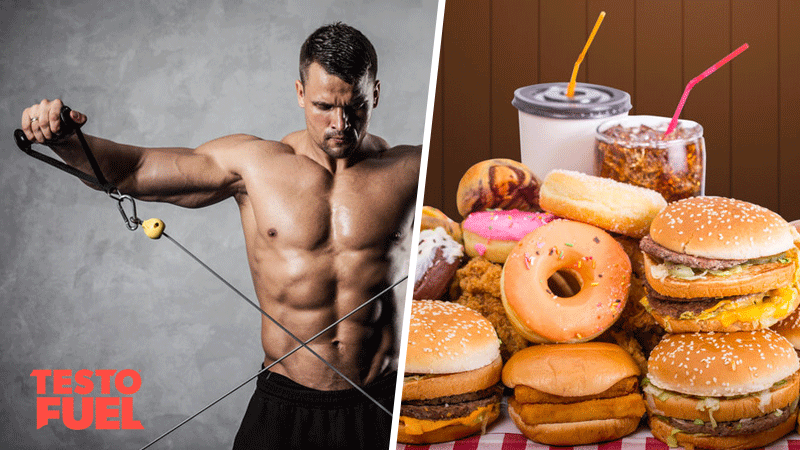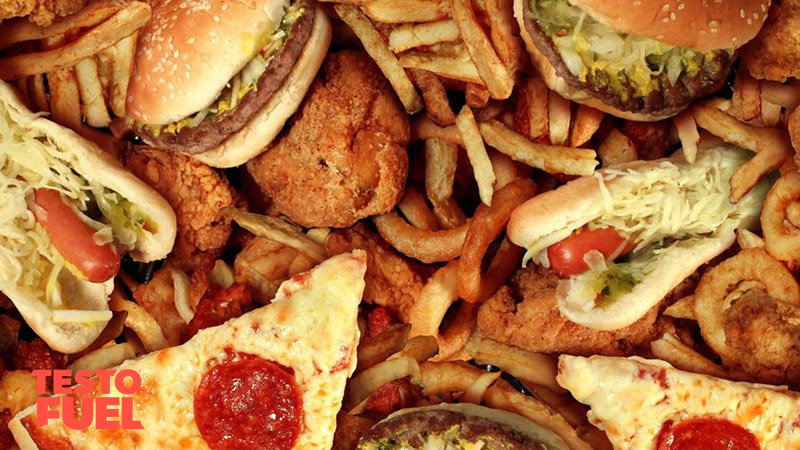TestoFuel Blog : Make Gains & Pack on the Muscle

Diet is one of the most effective ways to improve your testosterone. Eating foods that are high in healthy fats, or foods such as cruciferous vegetables that can help to reduce estrogen levels can help you to raise your testosterone production.
But not all foods are good for testosterone. Some foods can actually harm it. Either by directly affecting testosterone production, by increasing estrogen levels, or by causing excessive body fat accumulation, which can lead to lowered testosterone over time.
While most of your diet should be centred around foods that can raise your testosterone levels, it is also important to identify and avoid foods that may (in large quantities) lower your testosterone levels. It should be noted, that most of the foods on this list are harmless when consumed in moderation.
Having one or two beers each week is not going to lead to low testosterone. However, drinking five per night could well be an issue. The same goes for liquorice, junk food, and vegetable oils.
This sweet, black-coloured food comes from the root of the glycyrrhiza glabra plant and contains a chemical called glycyrrhizin.
Because it’s so sweet (the name literally means ‘sweet root’), glycyrrhizin is used to flavour a range of foods such as candy, tobacco, alcoholic drinks, herbal teas and breath fresheners. It’s even used in some medications too. The problem is though that liquorice is a testosterone-killing food and should be avoided.
Studies have shown that liquorice reduces T levels by as much as 40%, with glycyrrhizin being the culprit [1].
That’s not a one-off study either. Other research papers [2] have shown that even a small amount of glycyrrhizic acid – a metabolite of glycyrrhizin – can cause a drop in testosterone from 740 ng. dL to 414 ng. dL. That’s not too far from the 240 ng. dL cut off for hypogonadism.
Finally, another study reported that when a group of volunteers were given 7 g liquorice to eat, T levels were a full 26% lower – even after 7 days [3].
This is an unfortunate one because we all like a tipple from time to time. An occasional drink probably isn’t going to do you harm; it’s when you hit the bottle on a regular basis that your T levels will take a hit.
Ethanol is the active ingredient in beer, wine and spirits that acts as a nervous system depressant. It slows down your bodily functions which is why you stagger around and slur your words when you’ve had one too many.
Not only is alcohol nearly as calorific as fat (ethanol gives you 7 kcal per gram) it is also toxic in large amounts. It provides a lot of energy, but no nutrients. Studies show that when it comes to testosterone, alcohol can be catastrophic. It is definitely one of the most potent testosterone-killing foods.
For example, when one research project asked a group of healthy men to consume 1.75 grams of alcohol per kilogram of body weight, testosterone levels reduced for a full 24 hours after the drinking ‘binge’ [4].
It’s not that soda or fizzy drinks can directly lower testosterone, but they are one of the biggest causes of weight gain. Drinking sugary drinks can lead to over-consuming calories. By as much as 17% in some studies [5].
And as you’ll likely know, weight gain is one of the biggest causes of low T. It’s also strongly linked with an increased risk of diabetes and heart disease too. Switching to diet versions of your favourite drinks can help to prevent weight gain, and drinking water instead can be even more beneficial.
The fast-food industry is thriving. It generates over $5 billion in sales each year and accounts for nearly 5% of annual gross domestic product. When we’re talking about junk food we’re referring to any food that is high in calories, sugar or saturated fat and has little nutritional value.
Hamburgers, pizza, hot dogs and fried chicken are all junk. Even sweet foods such as milkshakes, churros, cakes and candy are low in nutrients but high in calories. They’re junk too.
Men with less healthy diets have lower T levels [6]. One study (using a huge sample of over 8,000 people) found that junk food increases exposure to phthalates – a group of chemicals used to make plastic. And it’s these ‘plasticisers’ that have been seen in clinical trials to reduce T by as much as 30% [7].

Lastly, we’ve got vegetable oils – in particular those high in polyunsaturated fat (PUFA). Higher intakes of these increases your risk of a number of metabolic and inflammatory diseases:
Cooking oils such as canola, safflower, olive and soybean have a low smoke point and often used refined ingredients. Research shows that vegetable oils contribute to male infertility by reducing testicular tissue function, sperm motility and testosterone levels too [8].
When it comes to boosting male hormone levels and keeping your body running at optimal levels, it’s all about nutrition. These testosterone-killing foods might be okay on an occasion but shouldn’t form part of a regular diet for any man wanting to perform well and lead a healthy lifestyle.